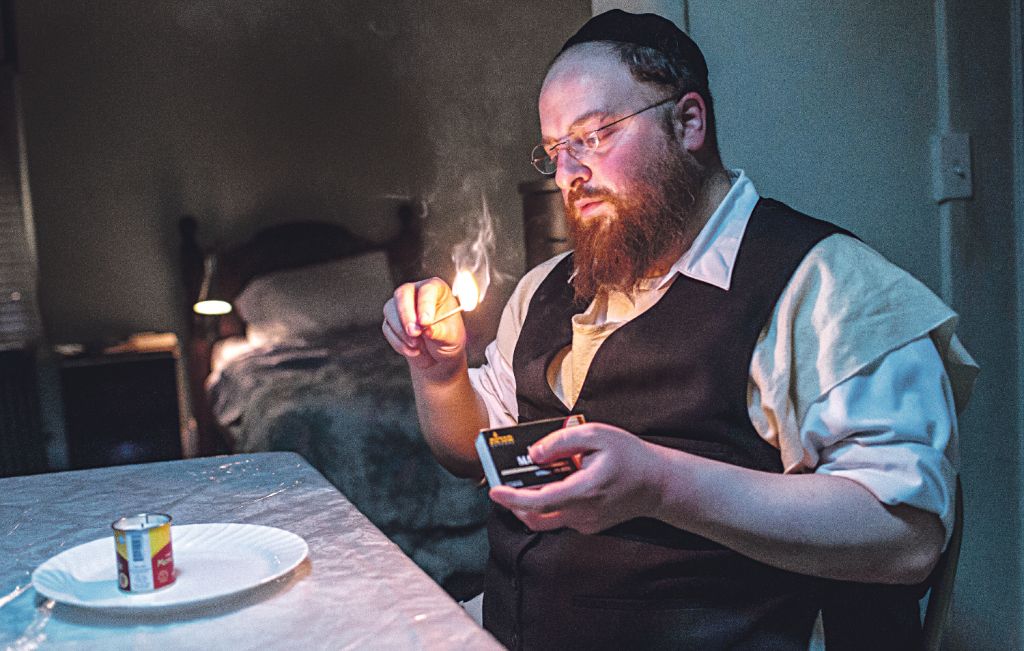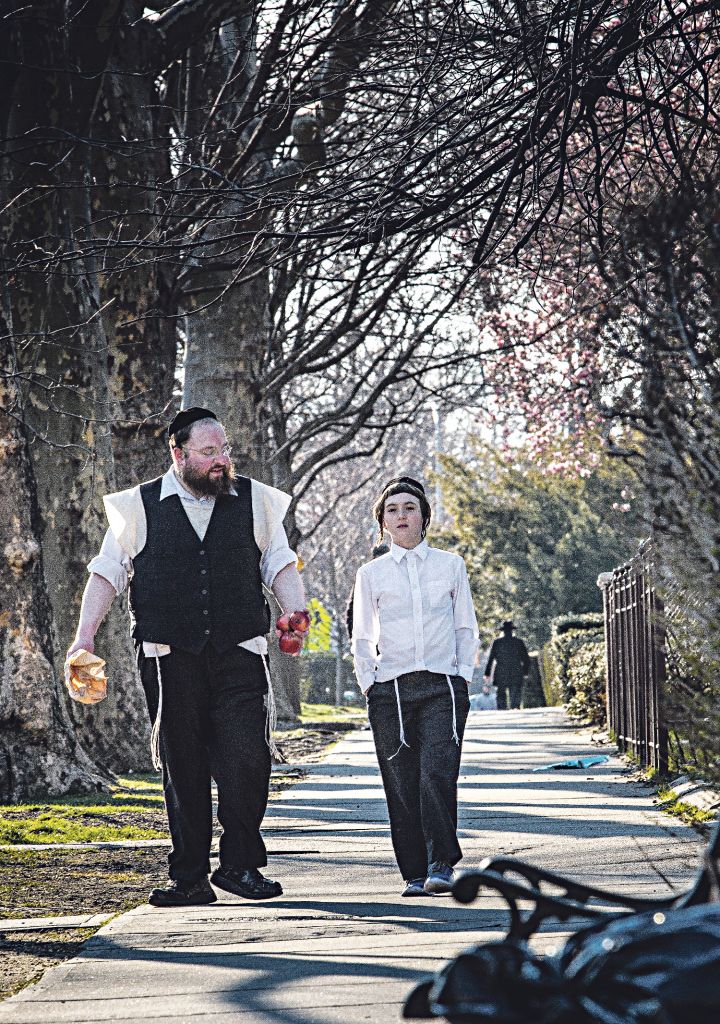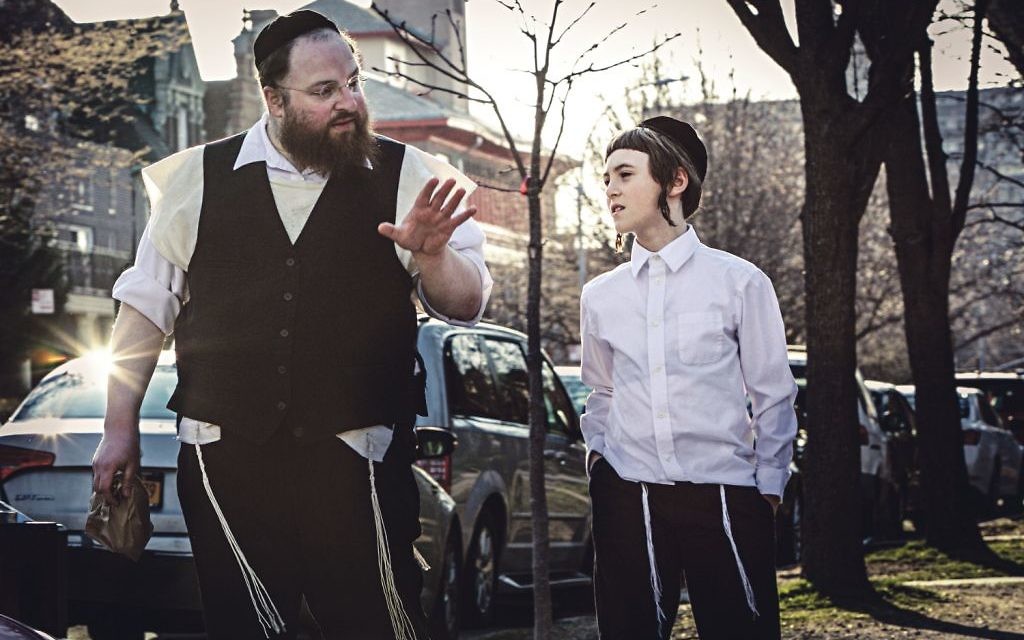A true portrayal of Chasidic life
The first film in 70 years made entirely in Yiddish has won critical praise. Its director tells Francine Wolfisz about the difficulties of making it – and the rewards
Nobody makes a film on a low budget with unknown actors in a language that no one speaks,” jests writer and director Joshua Z Weinstein.
And yet, despite the obvious drawbacks – including this being the first film in 70 years made entirely in Yiddish – this unusual strategy has garnered critical acclaim for his latest film, Menashe, which is released in UK cinemas tomorrow (Friday).
Set within Brooklyn’s strictly-Orthodox community, the story revolves around a kind and hapless supermarket assistant (played by Menashe Lustig), who, in the wake of his wife’s death, is prevented by Jewish tradition from raising his young son, Rieven (Ruben Niborski), alone.
Get The Jewish News Daily Edition by email and never miss our top stories Free Sign Up
The child is instead sent to live with Menashe’s strict brother-in-law, Eizik (Yoel Weisshaus), leaving Menashe heartbroken. Frustrated by his situation, he asks his rabbi for one special week with Rieven before the first anniversary of his wife’s passing, to prove himself as a man of faith and fatherhood.
Weinstein, who was born in New York and raised in a family of “just regular, run-of-the-mill Jews”, has largely spent his life as an outsider to the tight-knit world of Brooklyn’s Chasidic neighbourhoods and admits to finding them “fascinating”.
During his younger years, Weinstein recalls his grandfather, who owned a toy store in Brooklyn, gifting some of his stock to Russian orphans through the Lubavitch community.

“The Lubavitch group is Chassidic, but it’s the only one that does outreach and they use mobile phones and computers. But these are not the people we made the film about,” he explains.
“Everything I thought I knew about Chasidic Jews was wrong. Most Chasidic Jews are not like the Lubavitch; they are so much more insular, dogmatic and really following rules that haven’t changed in hundreds of years.”
It was a world into which Weinstein wanted to delve further and make a film about, with the caveat that it would not simply show men with beards and big hats and speaking in English.
Unlike previous portrayals of the Chasidic world on film, Weinstein was clear he wanted to produce something authentic, “because that world deserved an accurate representation of itself”.
But to do so was not without its obstacles.
Firstly, Weinstein was adamant the actors had to speak Yiddish, even though it’s a language he himself does not understand.
“To do the film in English would have been ludicrous,” he declares. “Whenever you see Hollywood films trying to show this world, it’s always in English with a few funny Yiddish words thrown in here and there, but nobody speaks like that.
“We really lent backwards to ensure it was all in Yiddish, even though it meant the film took much longer to complete.”

His next challenge was ensuring the cast were themselves from the strictly-Orthodox community – not an easy task by any means.
“There are hundreds of thousands of people in that community and most of them were against what we were trying to achieve,” laughs Weinstein. “Only a few dozen showed up for auditions.”
As a result, his telephone number was distributed throughout the community and eventually he was able to pull together “an incredible group of performers”, including his lead actor, Lustig.
Of his first meeting with Lustig, who lives in a Chasidic community in New Square, New York, and works as a grocer, Weinstein tells me he was “blown away by this large clown, who was one part hilarious and one part brooding”. He adds: “You could really feel the anxiety and weight of life on his shoulders. So there was something very captivating about him.”
Knowing he “wanted to write for something that existed”, Weinstein found himself inspired by Lustig’s own story.
He learned how, in 2008, Lustig’s wife had died suddenly and the community had decided it would be better for his young son to live with a foster family. “The film is his emotional truth,” explains Weinstein. “In some ways it was quite traumatic for Menashe, because we were digging up the most difficult moments of his life and having to live them every day on set. But he also really enjoyed the opportunity to act and do something different.”
Since its premiere at the Sundance Film Festival earlier this year, Menashe has received positive reviews from the critics – as well as from some unexpected quarters.
“We thought there might be a backlash, but the Chasids have also been supportive of the film,” Weinstein reveals. “They like that it doesn’t sensationalise their lives. Many don’t go to the cinema – but some secretly do – and tell me that the film shows just how their lives really are. They appreciate that.”
υMenashe (U) is released tomorrow (Frid ay)

Thank you for helping to make Jewish News the leading source of news and opinion for the UK Jewish community. Today we're asking for your invaluable help to continue putting our community first in everything we do.
For as little as £5 a month you can help sustain the vital work we do in celebrating and standing up for Jewish life in Britain.
Jewish News holds our community together and keeps us connected. Like a synagogue, it’s where people turn to feel part of something bigger. It also proudly shows the rest of Britain the vibrancy and rich culture of modern Jewish life.
You can make a quick and easy one-off or monthly contribution of £5, £10, £20 or any other sum you’re comfortable with.
100% of your donation will help us continue celebrating our community, in all its dynamic diversity...
Engaging
Being a community platform means so much more than producing a newspaper and website. One of our proudest roles is media partnering with our invaluable charities to amplify the outstanding work they do to help us all.
Celebrating
There’s no shortage of oys in the world but Jewish News takes every opportunity to celebrate the joys too, through projects like Night of Heroes, 40 Under 40 and other compelling countdowns that make the community kvell with pride.
Pioneering
In the first collaboration between media outlets from different faiths, Jewish News worked with British Muslim TV and Church Times to produce a list of young activists leading the way on interfaith understanding.
Campaigning
Royal Mail issued a stamp honouring Holocaust hero Sir Nicholas Winton after a Jewish News campaign attracted more than 100,000 backers. Jewish Newsalso produces special editions of the paper highlighting pressing issues including mental health and Holocaust remembrance.
Easy access
In an age when news is readily accessible, Jewish News provides high-quality content free online and offline, removing any financial barriers to connecting people.
Voice of our community to wider society
The Jewish News team regularly appears on TV, radio and on the pages of the national press to comment on stories about the Jewish community. Easy access to the paper on the streets of London also means Jewish News provides an invaluable window into the community for the country at large.
We hope you agree all this is worth preserving.
-
By Laurent Vaughan - Senior Associate (Bishop & Sewell Solicitors)
-
By Laurent Vaughan - Senior Associate (Bishop & Sewell Solicitors)
-
By Laurent Vaughan - Senior Associate (Bishop & Sewell Solicitors)
-
By Laurent Vaughan - Senior Associate (Bishop & Sewell Solicitors)






















